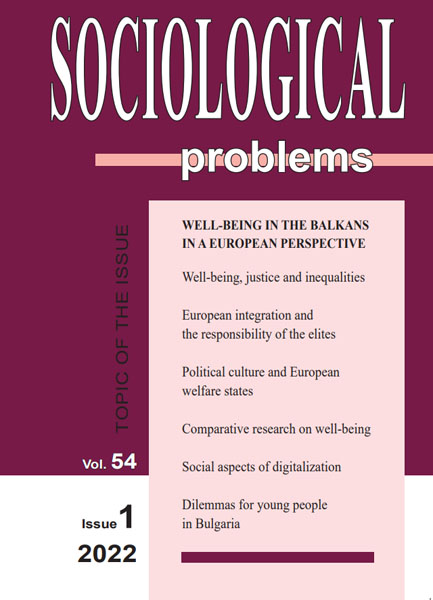Inequalities and Justice in the Balkans. A Comparison Between Bulgaria, Croatia, Montenegro, Slovenia and Serbia
Inequalities and Justice in the Balkans. A Comparison Between Bulgaria, Croatia, Montenegro, Slovenia and Serbia
Author(s): Rumyana Stoilova, Kaloyan Valentinov HaralampievSubject(s): Social Sciences, Sociology, Social development, Social differentiation, Globalization
Published by: Институт по философия и социология при БАН
Keywords: justice; normative beliefs; income structure; comparative micro-macro approach
Summary/Abstract: This paper offers a comparison between five Balkan countries (Bulgaria, Slovenia, Croatia, Montenegro and Serbia), based on data from the European Social Survey (2018). Distributive fairness, i.e., individual attitudes to the principles of just income distribution, is in focus. The aim is to compare the stratified normative beliefs of the low, middle and high income groups to distributive justice and to investigate individual and macro level factors for fairness assessments of the receivedThis paper offers a comparison between five Balkan countries (Bulgaria, Slovenia, Croatia, Montenegro and Serbia), based on data from the European Social Survey (2018). Distributive fairness, i.e., individual attitudes to the principles of just income distribution, is in focus. The aim is to compare the stratified normative beliefs of the low, middle and high income groups to distributive justice and to investigate individual and macro level factors for fairness assessments of the received wages. The results show that meritocratic beliefs predominate over egalitarian ones, and the former are shared by different income strata in the five countries. At the opposite, the discrepancy between the income strata in sharing of egalitarian beliefs exists in all compared countries. The strongest factor of assessing one’s income as unfairly low is the size of the received pay, followed by the level of education and gender. Fewer women than men assess their incomes as fair when controlling for education. Higher assessments of unjust income are made by people with low or medium income and with education less than tertiary. Of the macro-factors, only the Gini coefficient increases the assessment of income as unfairly low. The conclusion is that macro differences between Balkan countries are decreasing, beside the overall level of inequality in the respective society, but the importance of inequalities based on individual factors and social positions is growing.
Journal: Социологически проблеми
- Issue Year: 54/2022
- Issue No: 1
- Page Range: 32-48
- Page Count: 17
- Language: English
- Content File-PDF

